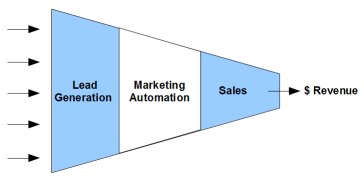Today, most companies use some kind of online marketing—via a website, email marketing, a customer relationship management (CRM) system, or search advertising.
Recently, a new type of online marketing system, marketing automation, has become popular. What is it, how does it work, and should you adopt it?
What Is Marketing Automation?
A marketing automation system helps you manage your leads, which is different from lead generation. The goal of lead generation is to get more names in your database; the goal of marketing automation is to transform raw leads into Sales-ready leads.
Marketing automation bridges the gap between lead-generation activities and follow-up by Sales. Because Sales will get better-educated leads who are ready to talk to a salesperson, it removes the main cause for tension between Sales and Marketing: low-quality leads.

The sales and marketing funnel:
Generating high-quality leads for Sales
How Does It Work?
A marketing-automation system's first task is to capture anonymous website-visitor statistics. When a visitor fills out a form, those statistics can be linked to an actual person. With a marketing automation system, you can quickly build a Web form, and—if needed—an entire landing page (useful for search advertising).
When you've captured a new lead, the marketing automation system can score the lead based on both demographic information and website activity. For example, a vice-president gets 10 points, but a student gets minus 5 points. Multiple visits to the website add more points. The goal is to nurture leads until they reach a certain threshold score, which is when you pass them over to Sales.
Marketing automation enables fully automated email-nurturing campaigns. You send a predefined sequence of emails, but, based on the lead's behavior you can also assign the lead to a different campaign, such as an accelerated campaign or a campaign that is focused on a different product.
The nurturing emails can contain offers, such as a whitepaper or webinar. With every form submission you can ask additional information, so you can update the lead score with new information. And with every action—website visit, email click, or registration—you can also change the lead score.
When leads reach a certain lead score, they are called "sales-ready" and passed on to the sales team. Because all information about the lead is synchronized with the CRM system, the sales rep has a wealth of information to prepare for the first call. Even more, the rep can get a real-time notification when the lead is on the website, which is a perfect time to give the lead a call.
Last but not least, the marketing-automation system provides marketers with many reports on campaign performance and funnel movement.
Is It Email Marketing?
Yes and no. Marketing automation includes all common email-marketing functionality, but it is much more than just email marketing.
The first differentiator is that marketing automation supports fully automated campaigns, involving multiple messages sent at different points in time, often triggered by an email click or a website visit. Rather than sending all leads the same email newsletter, you can now differentiate based on the lead's behavior and preferences.
Marketing automation also provides additional features above and beyond email marketing, such as creation of landing pages and registration forms, lead scoring, lead tracking, synchronization with the CRM system, and marketing-campaign reporting.
Is It CRM?
Marketing automation is to marketers what CRM is to salespeople.
Most CRM systems have a marketing module that usually involves assigning leads to campaigns and then calculating the sales pipeline associated with each campaign. Email marketing is limited, lead scoring is rudimentary, landing-page support is minimal, and website tracking is nonexistent.
Simply said: CRM is for Sales and marketing automation is for Marketing, which is totally fine as long as there is a tight integration between the two. And that is something that all marketing-automation systems provide out of the box.
Are You Ready for Marketing Automation?
The question is complex enough to justify a whole series of blog posts, but let me address the main points. Marketing automation is a tool and provides no magic by itself. You need the right people and processes to make it a success.
To be successful, you need to have an ideal-customer profile and a good working relationship with Sales, so you can easily set up initial lead-scoring rules. You also need a fair amount of leads in your database and enough new leads coming in; if not, you have a lead-generation problem that should be solved first.
A big part of lead nurturing is educational content. If you don't have content such as whitepapers or webinars available today, you should create it as part of your marketing-automation project. It is also useful if you know what goals you want to reach and which metrics you want to monitor.
And, as a rule of thumb, most companies that use marketing automation already had prior experience with email marketing, CRM, and Web analytics. If you have never used any of those, marketing automation may be premature.
The Future of Marketing Automation
According to Forrester Research, only 2%-5% of B2B companies use a marketing-automation system today. So if you're not using marketing automation yet, don't worry; most of your competitors won't be using it, either.
But if you're ready for it, implementing marketing automation today certainly gives you a competitive advantage.



